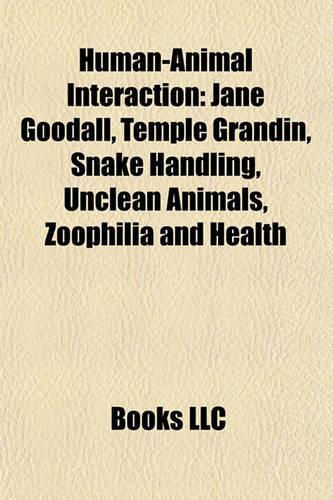
Human-Animal Interaction
Series: English
Please note that the content of this book primarily consists of articles available from Wikipedia or other free sources online. Pages: 136. Not illustrated. Chapters: Jane Goodall, Temple Grandin, Snake Handling, Unclean Animals, Zoophilia and Health, San Luis National Wildlife Refuge Complex, Devocalization, Hippotherapy, Animal-Assisted Therapy, Therapeutic Horseback Riding, Warren, Gorillas in
NaN
VOLUME
English
Paperback

Please note that the content of this book primarily consists of articles available from Wikipedia or other free sources online. Pages: 136. Not illustrated. Chapters: Jane Goodall, Temple Grandin, Snake Handling, Unclean Animals, Zoophilia and Health, San Luis National Wildlife Refuge Complex, Devocalization, Hippotherapy, Animal-Assisted Therapy, Therapeutic Horseback Riding, Warren, Gorillas in the Mist: the Story of Dian Fossey, Shooting, Shoveling, and Shutting Up, Effects of Equine Assisted Therapy on Autism, Insecticidal Soap, David Sheldrick, Pet Cemetery, 1992 Cageless Shark-Diving Expedition, Daphne Sheldrick, Binti Jua, Bears in Anchorage, Alaska, Mike Rutzen, Wildlife Disease, Biotherapy, Cattery, Deaf Animals, Skinning, Monkey Painting, Animal Transporter. Excerpt: Unclean animals, in some religions, are animals whose consumption or handling is labeled a taboo. According to these religions' dogmas, persons who handle such animals may need to purify themselves to get rid of their uncleanness. The origins of practices in relation to "clean animals" and "unclean animals" are lost to prehistory, but are maintained by several large religions. The idea that some animals are dangerous or disgusting is present in almost all known human cultures. This could be due to the fact that in ancient times people had not realized how to preserve and prepare some foods. For instance, pork not prepared or stored properly can cause illness, as can some seafood. Pigs are also common vectors in transmission of the flu to humans from birds since they are immunologically similar to humans. By labeling the animal as unclean and forbidden, consumption and handling of those potentially dangerous foods would not occur. In Judaism, Kashrut (kosher) is the set of dietary laws governing what can or cannot be consumed. These laws are based upon the Torah and the Talmud. According to Jewish law, mammals that both chew their cud (ruminate) and have cloven hooves are kosher. Animals wi...
Price Comparison [India]
In This Series
Bestseller Manga
Trending NEWS




















